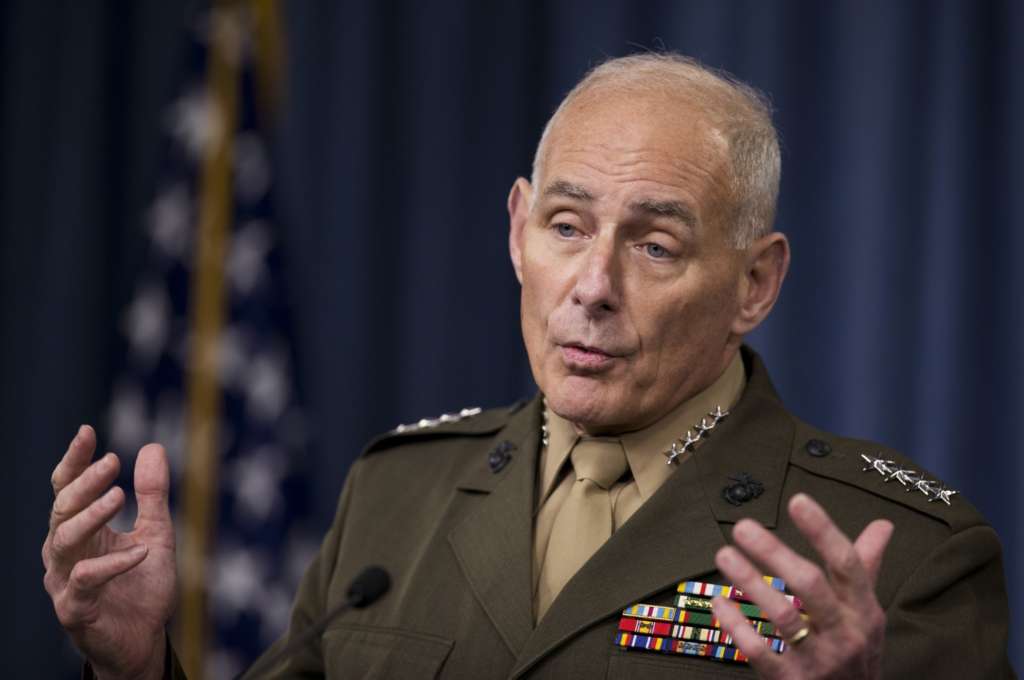The Obama administration is dismantling a homeland security program created to track immigrants from Muslim-majority countries in an attempt to prevent President-elect Donald Trump from fulfilling his campaign promise to create a Muslim registry. As an American Muslim and human rights advocate, I am hoping against hope that retired Gen. John F. Kelly, the homeland security secretary nominee, will not reassemble the program.
Kelly is not an obvious champion of human rights. As head of U.S. Southern Command, Kelly oversaw Guantanamo, where he frequently dismissed human rights concerns. Dozens of people languished in detention without charge, and many were force-fed after going on hunger strikes. But he could be our best hope in the Trump administration.
While at Southern Command, Kelly invited critiques from human rights groups. Every year, he asked Amnesty International and other organizations to join him for a frank roundtable discussion. After one meeting, he took me aside to explain his point of view and hear me out. Dialogue and decency: In today’s hyper-polarized political climate, these are as rare as unicorns.
And they matter. If I could talk to Kelly today, I think he’d listen. I would tell him that people are afraid. Activists worry that if they speak out, the government could retaliate or put them under surveillance. Trump’s idle tweets about stripping people of citizenship for flag-burning are eerily reminiscent of foreign dictators threatening to jail people for peaceful dissent.
People like me — ordinary Americans with Muslim names and ancestry from Muslim-majority countries — fear being put on a watchlist, barred entry into the United States, even banned because of who we are. Many people — African Americans, Jewish Americans, Muslim Americans, immigrants who’ve spent most of their adult lives here — spent the holidays swapping stories of threats, harassment and even violent attacks by fellow Americans who think the election has given them license to act on hatred.
I believe Kelly would listen to me, not because he has ever agreed with me, but because he has been willing to talk. And a top national security official who values dialogue over diatribes is what we need to put the brakes on Trump’s most frightening counterterrorism proposals.
Kelly must not revive NSEERS (the National Security Entry-Exit Registration System). He is a smart man — he knows that a special registry would make for bad counterterrorism. Law enforcement officials need people to trust them and tip them off, not fear and avoid them. A special registration would send shockwaves through immigrant communities, inviting uncertainty and anxiety, more fear of law enforcement and less safety.
Unlike some of Trump’s other national security advisers, though, Kelly does not appear to be infected with bizarrely virulent anti-Muslim prejudice. And more than anything, the proposed Muslim ban, internment and special registration proposals are about prejudice — not safety. They cater to bigotry and fear, which fly in the face of our country’s most precious values. They tear at the seams of our commonality by implying that only some people are included in the ideals of liberty and justice. They drive people even farther apart from each other, after an election that already has left us fragmented.
It may be naive to think that Kelly — or anyone else in the Trump administration — would risk his career to stand in the way of anti-human rights proposals. But many of these proposals, only a short while ago, would have been considered unimaginable. They threaten to return this country to the grimmest chapters of our history, like the mass imprisonment of U.S. citizens and noncitizens of Japanese descent. They are the stuff of dystopic novels, of nightmares.
Kelly could reject the bigotry and irrationality of these proposals, and senators at his confirmation hearing should call on him to do so. The next secretary of homeland security can refuse to carry forward Trump’s anti-Muslim policies, and also decline to cooperate with the FBI or any other agency on the surveillance of activists, immigrants or particular communities. Perhaps most important, the general could use his position to counteract advisers who may tell Trump that he needn’t listen to the millions of Americans who support human rights and civil liberties.
Naureen Shah is director of security and human rights at Amnesty International USA.
The Washington Post
